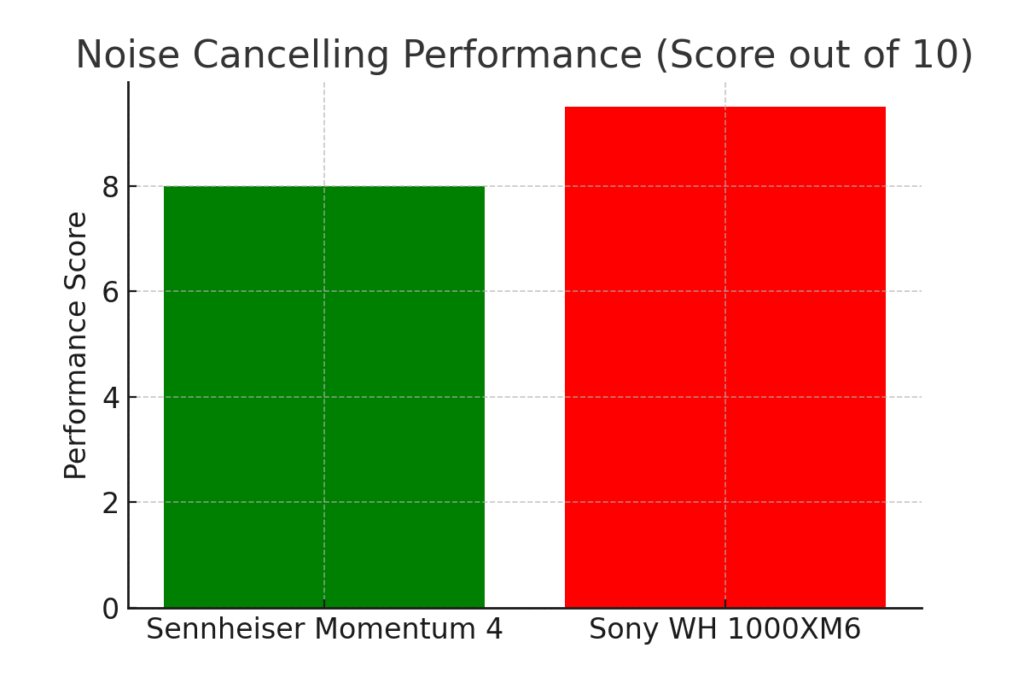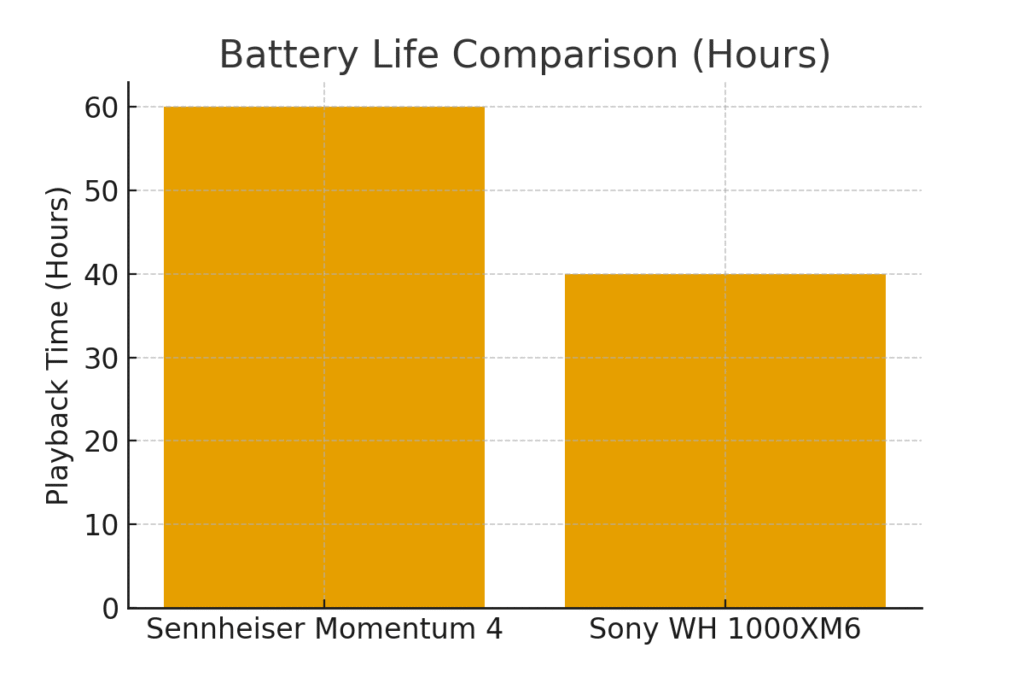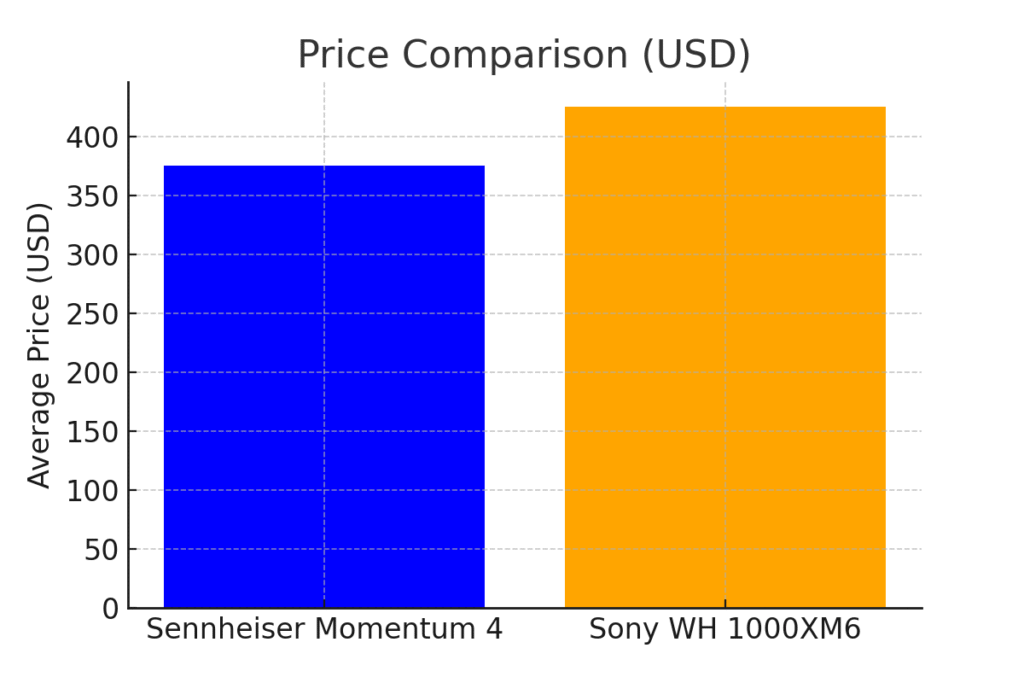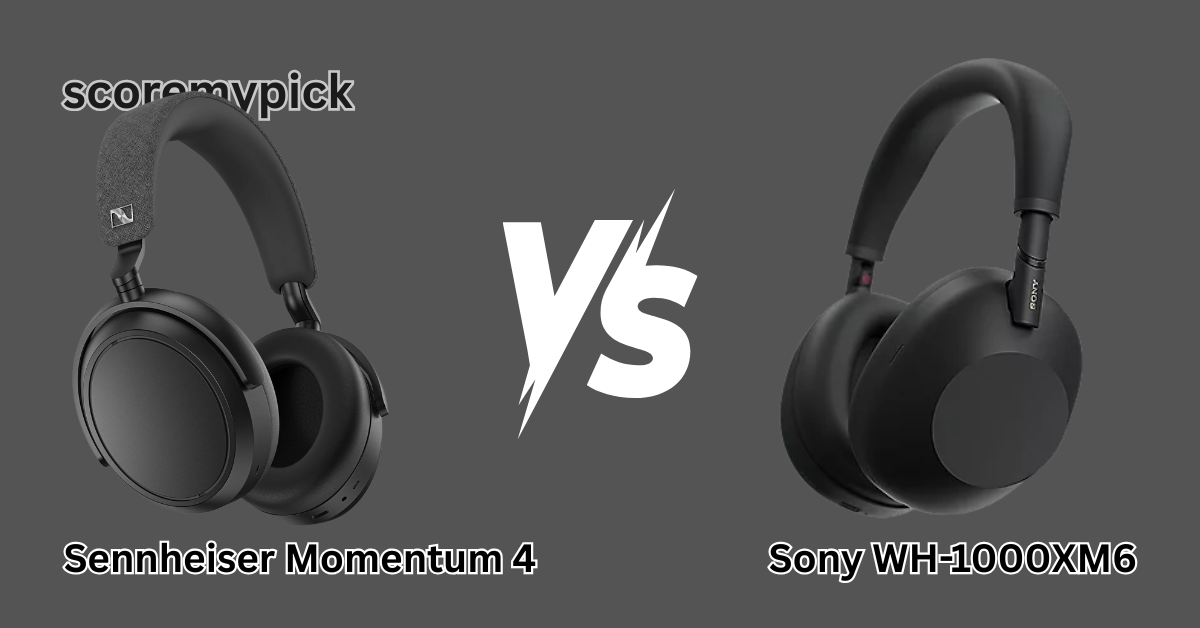Speaking of high-end wireless headphones, two brands can never go without being mentioned: the Sennheiser Momentum 4 and the Sony WH-1000XM6. Both have been synonymous with high-quality audio performance, innovation and comfort that are ahead of their time.
The question is which one should be ranked first by the audiophiles, frequent travellers and casual listeners. This review will take a closer look at each significant feature, including design and sound quality, noise cancellation and battery life. At the conclusion, you will be able to understand what kind of headphones is the best choice in your life.
Design and Comfort Sennheiser Momentum 4 vs Sony WH-1000XM6
The headphone design not only concerns the style, but it also concerns long-term comfort. Sennheiser Momentum 4 is minimalistic but sleek with minimalist lines and high-quality materials.
It has plush ear cushions and a lightweight frame that makes it easily portable when it comes to prolonged listening. The adjustable headband does not cause excessive pressure to the head, as also a plus for individuals who wear headphones for several hours.
Sony WH 1000XM6, in its turn, carries the spirit of sleek and modern design that Sony has in recent times. Its design is more futuristic and is soft-padded with an ergonomic headband.
The ear cups are smooth in rotation, making them easy to store and carry around. On comfort, Sony has concentrated on the supply of a lower clamping force while keeping it stable, which is good to choose in long flights, or even on a daily commute.
When comparing both, Sennheiser leans more toward understated luxury while Sony emphasizes modern practicality. Comfort levels are very close, but users with larger ears may find the spacious ear cups of the Momentum 4 more accommodating.
Sound Quality Comparison: Sony WH-1000XM6 vs Sennheiser Momentum 4
Sound quality is often the deciding factor for anyone investing in premium headphones. Sennheiser has always been recognized for its audiophile-grade tuning, and the Momentum 4 is no exception.
It offers a balanced and natural sound signature with crystal clear mids and sparkling highs. The bass is deep yet controlled, making it ideal for classical music, jazz, and acoustic tracks where detail is essential.
Sony WH-1000XM6 goes a bit different with its approach to a bass-rich profile. It is warmer with upfront low-end sounds that will appeal to hip hop, pop, and electronic music fans. The mids or highs are slightly damped, with the highs being rolled somewhat off, and this would not make the highs harsh even at high volumes.
The two headphones decode high-resolution audio codecs, such as LDAC and aptX Adaptive, which is the best possible streaming quality. But Sennheiser gives a more unbiased studio sound compared to Sony, which has an active sound that is enjoyed by many casual listeners.
To put it in plain terms, Momentum 4 suits more to the purist and WH 1000XM6 to those who want a strong bass and sound immersion.
Noise Cancelling Performance Sony WH 1000XM6 vs Sennheiser Momentum 4
Noise cancellation is one of the most important features in modern wireless headphones. Sony has long been considered the leader in this field, and the WH 1000XM6 continues that legacy.
With adaptive noise cancelling powered by advanced algorithms, it adjusts automatically to different environments. Whether you are on a crowded train or an airplane, background sounds are reduced to a whisper. The ambient mode also allows you to hear your surroundings when needed, making it very versatile.

Sennheiser Momentum 4 also delivers excellent noise cancelling, but with a slightly different tuning. While it blocks out most low-frequency sounds like engines and traffic noise, some higher-pitched sounds may still seep through. However, it still performs impressively well for daily use and is more than enough for office or travel environments.
In direct comparison, Sony WH-1000XM6 has a small edge due to its advanced adaptive system and real-time optimization. Sennheiser comes very close and will satisfy most users, but if noise cancelling is your top priority, Sony is the safer choice.
Battery Life and Charging Momentum 4 vs Sony WH 1000XM6
Battery performance is a key factor when choosing premium headphones. Sennheiser Momentum 4 sets a new benchmark in this category by offering up to 60 hours of continuous playback on a single charge.
This is nearly double the average battery life of most wireless headphones. A quick charge of just 10 minutes gives up to 6 hours of listening, which is extremely convenient for travelers or busy professionals.

Sony WH 1000XM6 provides up to 40 hours of battery life with noise cancelling turned on, which is still very impressive but slightly behind the Momentum 4. With noise-cancelling off, the playback time extends further. The fast charging feature gives around 5 hours of use in just 10 minutes of charging, making it highly practical for users on the go.
While both headphones deliver outstanding battery life, the Momentum 4 clearly leads in raw endurance. For users who dislike frequent charging and want headphones that last for days, Sennheiser is the better option. Sony balances excellent battery performance with its premium features, making it more than sufficient for most people.
Smart Features and Connectivity Sennheiser Momentum 4 vs Sony WH 1000XM6
Smart features are becoming just as important as sound quality. Sony WH 1000XM6 is packed with intelligent functions, including adaptive sound control, speak to chat, and touch sensor controls. The headphones can pause music automatically when you take them off and resume when you put them back on.
Sony also provides an advanced app with EQ customization, spatial audio support, and multipoint connectivity that allows pairing with two devices at once.
Sennheiser Momentum 4 also offers smart features, but keeps them simple and user-friendly. It supports customizable EQ through the Smart Control app, multipoint connectivity, and intuitive touch controls.
The transparency mode works smoothly, letting you hear outside sounds without removing the headphones. Although it does not have as many advanced AI-driven features as Sony, it focuses on reliability and ease of use.
In terms of connectivity, both headphones support Bluetooth 5.2 and high-quality codecs for stable connections. Sony has a slight edge in software innovation, while Sennheiser impresses with a more streamlined and straightforward user experience.
Price and Value for Money: Which Headphones Should You Buy
Price always plays a major role in the decision-making process. The Sennheiser Momentum 4 usually retails around 350 to 400 US dollars, depending on the market and promotions. Considering its exceptional battery life and refined sound signature, it offers strong value for listeners who want long-lasting performance with premium quality.
Sony WH-1000XM6 is priced slightly higher, often around 400 to 450 US dollars. The extra cost is justified by its advanced noise-cancelling technology, feature-rich app, and intelligent functions that enhance everyday usability. For people who value cutting-edge software and adaptive listening, Sony provides excellent value.

When comparing both, the choice comes down to what you prioritize most. If battery endurance and natural sound are your main requirements, Sennheiser gives you more for your money. If you prefer powerful bass, class-leading noise cancellation, and extra smart features, Sony is worth the higher price.
Final Words
The decision can be a dilemma of which Sennheiser Momentum 4 or Sony WH-1000XM6 is the best, since both are excellent headphones that dominate the high-end wireless market. The Intelligent Momentum 4 is illuminated with unsurpassed battery life, balanced audiophile-grade sound signature, and ergonomics that allow long listening hours. It is the most suitable option for people who love music and travel and need a long-lasting and consistent product.
The WH 1000XM6, however, is a master of adaptive noise cancelling and bass-driven sound and intelligent smart features that ensure day-to-day use is hassle-free. It is the ideal choice among commuters, frequent fliers, and anyone who desires to have headphones that adapt automatically to the surroundings.
Ultimately, the more suitable option is one according to your likes. The Sennheiser Momentum 4 will be unrivaled by the audiophile and tech enthusiasts, and noise-cancelling lovers will favor the long battery life users, and the Sony WH-1000XM6. In any case, both models are the best among the wireless headphones and assure a high-quality listening experience.
FAQs
Which is better for sound quality, the Sennheiser Momentum 4 or the Sony WH-1000XM6?
Sennheiser Momentum 4 delivers a more balanced and natural sound that appeals to audiophiles. Sony WH-1000XM6 leans toward a bass-heavy signature for casual listeners. Your choice depends on whether you prefer detailed accuracy or energetic sound.
How long does the battery last on the Sennheiser Momentum 4 and the Sony WH-1000XM6?
The Sennheiser Momentum 4 offers up to 60 hours of playback on a single charge. Sony WH-1000XM6 provides around 40 hours with noise cancelling on. Both have fast charging, but Sennheiser clearly leads in endurance.
Which has better noise cancelling, Sony WH-1000XM6 or Sennheiser Momentum 4?
Sony WH-1000XM6 is widely considered the leader in adaptive noise-cancelling technology. It adjusts automatically to your environment and blocks a wider range of sounds. Sennheiser also performs well but is slightly less advanced than Sony.
Do both headphones support multipoint connectivity?
Yes, both Sennheiser Momentum 4 and Sony WH-1000XM6 support multipoint pairing. This allows you to connect two devices at the same time, such as a phone and a laptop. Switching between calls and music becomes much easier with this feature.
Which headphone gives better value for money Momentum 4 or the WH 1000XM6?
Momentum 4 offers better value for users who want longer battery life and natural sound at a slightly lower price. WH 1000XM6 provides more advanced features and superior noise cancelling for those willing to pay extra. The right choice depends on your priorities.

